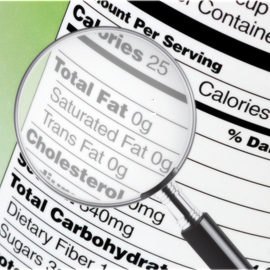Reading Labels after Bariatric Surgery in Macon
Posted: Mar 27 in Post-Bariatric Diet by Staff
 After getting bariatric surgery in Macon, just about every aspect of your diet is going to change. Immediately following your weight loss procedure you will be restricted to a liquid diet, but in time your stomach will heal and your bariatric surgeon will gradually reintroduce you to solid foods. As time goes on and you lose weight, you will be able to start eating a relatively normal diet. This is where you will need to learn how to make healthy dietary choices for yourself as well as your family.
After getting bariatric surgery in Macon, just about every aspect of your diet is going to change. Immediately following your weight loss procedure you will be restricted to a liquid diet, but in time your stomach will heal and your bariatric surgeon will gradually reintroduce you to solid foods. As time goes on and you lose weight, you will be able to start eating a relatively normal diet. This is where you will need to learn how to make healthy dietary choices for yourself as well as your family.
While you will not experience hunger in the same way after bariatric surgery, you will still have to make good dietary choices. For those who remain in charge of feeding their families while losing weight, the task of making healthy choices begins much sooner. Learning how to glean information from nutrition labels can help you stay on track with your health and wellness efforts—as well as guide your family to eat healthier throughout your journey with weight loss surgery.
Reading nutrition labels is one small task that can improve your diet starting now. Here are a few tips to get started:
- Check the protein. After bariatric surgery protein is essential. Your bariatric surgeon in Albany will tell you how many grams of protein you should be consuming daily. You will want to consume your protein in the least amount of calories by eating foods heavy in the nutrient. Protein levels can be found at the bottom of the middle section of the nutrition label. The word “protein” is often in bold font. The number of grams listed is the protein quantity per serving.
- Determine the calorie count. The information at the top of the nutrition label is some of the most pertinent. This includes the calorie count, the recommended serving size and the amount of servings per container. Never assume that one serving is one full bag, box or bottle of food or drink.
- Assess other nutrients. Since you are following a low calorie diet after bariatric surgery, you will want to make sure you get as many positive nutrients as possible in as few calories as you can. That means looking for higher values of nutrients like vitamins A and C, iron and calcium while keeping the calorie content low.
The percentages listed on the right hand side of the label will not be as true to your diet after bariatric surgery as they would have been previously, or as they may still be for your family members. These are the approximated daily values based off of standard diets. Your bariatric surgeon can help you determine what your new daily values are after weight loss surgery.
